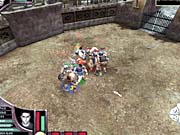It's not really clear why Activision Value and Cat Daddy Games chose October of 2002 to release Gladiators of Rome, a PC strategy game that revolves around traditional Roman arena battles, especially considering the fact that the popular motion picture Gladiator came and went two years ago. The game doesn't look or sound too spectacular, and its gameplay falls short in several areas. But if you can get past its problems, you may find Gladiators of Rome to be a quirky strategy game that's interesting to play--at least for a little while.

In Gladiators of Rome, you control a team of up to 10 gladiators, whom you buy from your local slave pen. Basically, you recruit gladiators from several weapon-based character classes (such as mace, hammer, blade, axes, and bows) and then participate in arena battles against other gladiators in preset matches as part of a linear single-player campaign. Each gladiator class has a standard attack, a standard defensive maneuver, the ability to walk or run to different parts of the arena, and two additional special abilities (for instance, the hammer gladiator has a double attack that deals double damage and a stun attack that briefly paralyzes a group of enemies), but you'll find that through most of the game long-range weapons like slings and bows aren't as reliable as close-range weapons. The actual gameplay generally comes down to ordering your team of gladiators to attack the opposing team until one group dies off, though you can also play the crowd by cheering at them, or using "finishing" attacks to down nearly-dead opponents--either of these actions can win you more prize money at the end of a fight.
Gladiators clearly draws inspiration from the Baldur's Gate role-playing series for its fighting system. All fights take place in real time, but since you'll be spending all your time giving specific orders to specific gladiators, you'll generally have to pause the game frequently by pressing the space bar, exactly like in Baldur's Gate. At its best, Gladiators is surprisingly enjoyable, because it has simple tactical elements, such as using a hammer fighter's stun ability to set up another gladiator's follow-up attack. At its worst, Gladiators is sluggish and boring, since all your gladiators' actions are dependent on onscreen bars that indicate your stamina, and you'll often find yourself waiting for your gladiators' stamina to replenish before you can execute your next maneuver. You'll also likely have problems with your gladiators' poor pathfinding and slow foot speed, which often result in pitched battles turning into a single ugly mass of arms and legs on the battlefield--one in which it's difficult to target the enemy you wish to defeat.

There are several other problems that you could cite about Gladiators of Rome. For instance, the game has only three arenas (each of which has only a handful of fights, which you perform in a single, linear order), so it's not terribly long. And just as your gladiators will have to overcome their initial enemies to get to their more-challenging foes, you'll have to overcome the game's lackluster graphics and sound to get any enjoyment out of the game. Gladiators of Rome is a 3D game that uses simplistic, occasionally primitive 3D graphics to represent its drab arenas and its limited selection of gladiator models. Though these gladiators can be outfitted with different weapons and armor that show up on the actual character models, they're still pretty blocky, and their animation is extremely limited, including nothing more than animations for walking, running, and a few maneuvers.
Gladiators of Rome's sound isn't particularly noteworthy either, since your gladiators possess only a few generic sound samples that become repetitious quickly, and the whole game is set to forgettable synth-orchestral music that's appropriate but easy to ignore. The game also doesn't try very hard to stay true to its subject. For instance, you buy your equipment and slaves using "dollars," and you train your gladiators by clicking on a little statistic button that increases their abilities (which are represented by green numbers on a status screen) rather than by training in a slave pit.
Gladiators of Rome had a lot of potential--the idea of fighting massive tactical battles against enemy gladiators and ferocious beasts could have made for an intriguing game. As it is, the game is still somewhat enjoyable in a simplistic way, but it's doubtful you'll enjoy it for long.